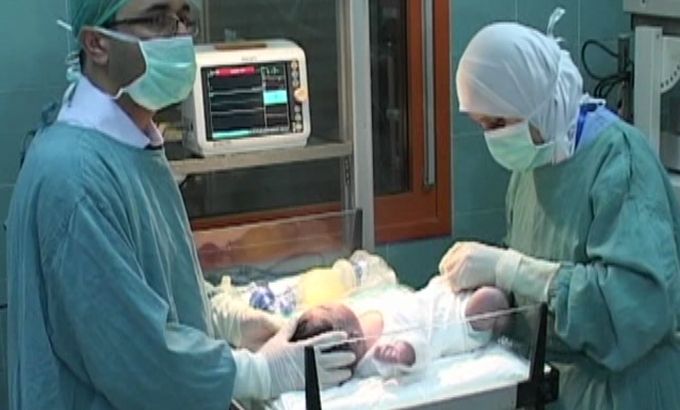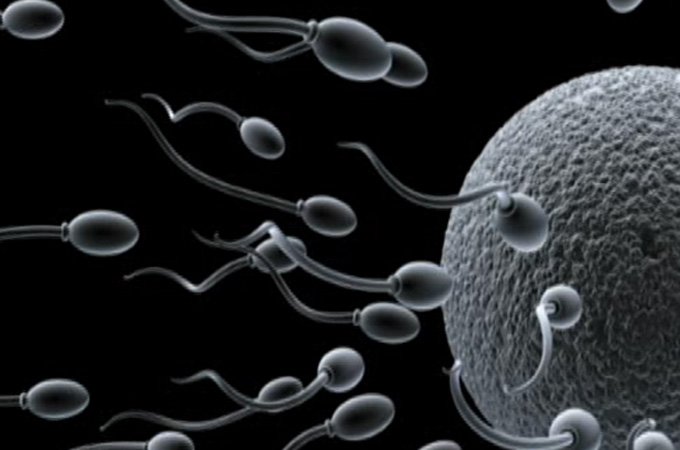Prison-smuggled sperm gives Palestinians hope
Women with husbands serving long terms in Israeli jails have resorted to sneaking sperm out and getting pregnant.

Nablus, West Bank – Dallal and Ammar al-Ziben’s eight-month-old baby boy will grow up to realise his parents were pioneers.
Ammar al-Ziben was sentenced to 25 years in jail for allegedly having planned deadly attacks against Israel. That was 15 years ago.
Despite the fact that conjugal visits are forbidden in Israeli prisons for the more than 4,800 Palestinians incarcerated there, Ammar managed to impregnate his wife from behind bars.
A sperm sample was spirited out of the Israeli prison of Hadarim, and Dallal gave birth to Muhanned last August – the first baby born to a Palestinian prisoner through a combination of sperm-smuggling and in vitro fertilization (IVF).
|
“She waited for her husband’s release from an Israeli prison for 26 years … The wives of the prisoners with long sentences pay the price twice.“ – Dr Salem Abu Khaizaran |
“Those were tough years until Muhanned came,” Dallal told Al Jazeera. “Muhannad brought life back to our house.”
The baby now crawls and mumbles, keeping everyone in their home busy, she added.
After Dallal al-Ziben gave birth to Muhannad, other Palestinian prisoners’ wives were emboldened to sneak their husbands’ sperm out of Israeli prisons in order to make babies.
Liberating sperm
At Razan Medical Center in Nablus, doctors say they get one or two smuggled sperm samples every week. At minus 196 degrees Celsius, the lab keeps about 65 smuggled sperm samples on ice for in vitro fertilisation.
So far, 22 Palestinian women have gone through IVF – the process whereby the egg is fertilised by sperm in a laboratory, and then placed into the woman’s body. Seven have become pregnant, including Dallal al-Ziben.
The success rate is lower than the 45 percent Dr Salem Abu Khaizaran shoots for. That can be blamed on the time needed to get the samples from the prisons to the occupied West Bank, the director of Razan Medical Center explained.
Dr Khaizaran said he didn’t know how sperm is spirited out – and doesn’t want to know.
Fortunately, he says, it only takes one good sperm to fertilise a female egg. Some Palestinian couples are even fortunate enough to be able to choose the baby’s sex. Given the opportunity, most choose a boy.
The process called “IVF-PGD” allows for implanting embryos of the desired gender in the mother’s uterus. It costs about $3,000 but the centre does it – and the IVF for the wives of prisoners with long sentences – for free.
Although these are fairly busy times, Dr Khaizaran said he’ll keep helping the families as long as he can, although he hopes his service soon becomes unnecessary.
Running out of time
 |
| Smuggled sperm is giving Palestinians hope |
Dr Khaizaran described the impact of his contribution through one case. Two years ago, a 46-year-old woman asked him for IVF.
“She waited for her husband’s release from an Israeli prison for 26 years,” Khaizaran explained, but it was too late – they couldn’t conceive.
“The wives of the prisoners with long sentences pay the price twice,” he said.
Dalla al-Ziben came to the health centre more than five years ago. But because of the conservative nature of Palestinian society, medical staff asked her to go back to her family and declare the plan to become pregnant to her community.
“You don’t want to see a pregnant woman, when you know that her husband is serving a long prison sentence,” Khaizaran said.
After she consulted with her family and went public with her intentions, al-Ziben said almost everyone encouraged her.
“People would stop me in the street to ask whether I did the IVF or not,” she told Al Jazeera.
Israel bans Palestinian prisoners from having conjugal visits, and even if those were allowed, many would pass on the offer because they don’t trust the Israeli authorities.
None of the pregnant women would say how the sperm was smuggled because they didn’t want to ruin it for others. “Let’s just say we’re creative,” al-Ziben said.
Israel prison services spokesperson Sivan Weizman said in February she “is aware of these rumours”, but added she was “very sceptical” that sperm-smuggling had taken place because of restrictions on prison visits.
“The women who do come to the prisons don’t have direct contact with the detainees, and when they leave they must pass through controls,” Weizman said.
Giving hope
Lidya Rimawi’s husband, Abdul Karim, has served 12 of a 25-year sentence, after a court convicted him of wounding an Israeli and being a member of Fatah’s military wing. The couple has a 12-year-old daughter whose father didn’t get to witness her birth.
“I love him,” Rimawi said with a smile. “I want to have a bigger family with him.”
|
“It’s going to be hard for me to get pregnant at that age. That’s why we thought of it. We want something that will bring life back to us.” – Lidya Rimawi, sperm-smuggler |
But waiting another 13 years would greatly reduce their chances of that. That’s why Rimawi turned to sperm-smuggling and in vitro fertilization.
“The people around me encouraged me to do it, they said ‘inseminate’. Everybody told me ‘do it, try it’. So I did it,” she said.
Her baby – Majd Abdul Karim Rimawi – is due in August 2013. His mother is postponing the trip to Nafha prison until she gives birth. “I’ll go visit Abdul Karim with the baby,” Rimawi said.
About 4,800 Palestinians are serving sentences in Israeli prisons, with 1,000 of those saddled with 20 years or more.
For many Palestinian families split by incarceration, raising babies from prison-smuggled sperm brings hope.
“After my husband finishes his sentence … he’s going to be 50 years old and I’ll be 50 as well. It’s going to be hard for me to get pregnant at that age,” Rimawi said. “That’s why we thought of it. We want something that will bring life back to us.”